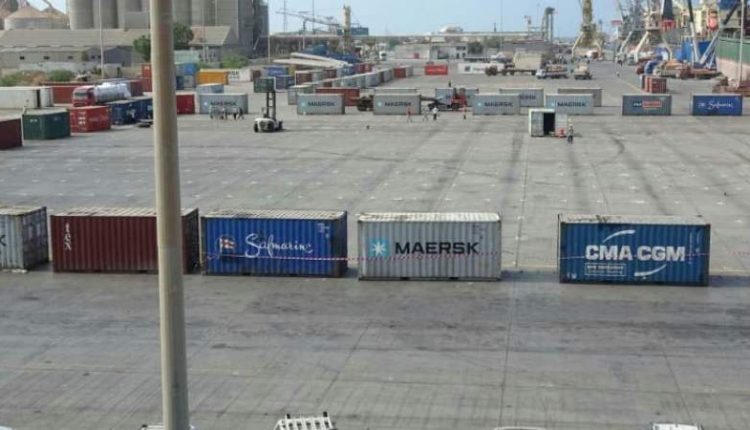Yemen’s Red Sea Ports Corporation Condemns US-Saudi Continued Detention of Food Ships
The Red Sea Ports Corporation issued a brief statement, confirming the US-Saudi coalition continuing to detain food and Oil ships off the coast of the Red Sea, preventing them from entering the port of Hodeidah.
The corporation’s statement said that 5 ships loaded with rice, corn, soybeans, wheat and peas are expected to arrive at the port of Hodeidah during the next week.
The statement also revealed the movement of ships, the names of some of the ships that arrived at the port of Hodeidah, as follows: Vessels moored at the quays of the port are a Sugar ship, Wheat ship, Container ship and Flour vessel.
Regarding the ships waiting in the draft for docking, there are seven oil derivatives ships, two wheat ships and a rice ship.
In October, the Minister of Transport, Abdulwahab Al-Durra, called on the United Nations to conduct an urgent and joint investigation into the issue of the burning and sinking of the container ship TSS pearl off the coast of Jizan in the Red Sea.
Minister Al-Durra was surprised by the United Nations’ disregard for the accident of the ship, which the US-Saudi aggression coalition refused to help and did what was necessary to save it while the fire was burning in it, which lasted nine days until it sank with the containers of food and medicine on it for the Yemeni people.
Saudi Arabia forces all ships entering Yemeni ports under the control of the coalition to go first to Jeddah or Djibouti port for inspection before allowing them to leave after long days in detention.
The Minister of Transport demanded that the ships of international shipping lines enter Yemeni ports directly without converting them to intermediate ships and lines, such as those that were exposed to fire and drowning, in order to prevent these accidents and the additional expenses that are reflected on goods and merchandise.
He confirmed the piracy on ships in light of international silence, considering this a violation of all laws, charters and international agreements, calling for pressure on the concerned authorities to quickly compensate the merchants affected by the sinking of the container ship and allow all ships to enter the port of Hodeidah in implementation of the Stockholm Agreement.
For his part, the head of the Secretariat’s Chamber of Commerce and Industry demanded to quickly compensate the owners of container goods that were carried by the container ship that sank off the coast of Jizan.
Container ship TSS PEARL on Oct 13 reported sank in Red sea after major fire. Many floating containers reported drifting in the area.
Earlier, a French website pointed the child victims of the aggression on Yemen, describing the war on Yemen as “terrible and a disaster for childhood”.
The French (Regards Protestants) website said that the figures for the number of victims of the war in Yemen are terrible and speak of a real catastrophe, stressing that the US-Saudi-Emirati aggression that has been going on for 8 years has killed and injured more than 11,000 children since 2015, an average of 4 children per day, according to UNICEF, while the numbers speak of the ongoing humanitarian catastrophe in this country.
It added that since 2015, more than 11,000 children have been killed, maimed or wounded, as the French newspaper “Le Monde” wrote, quoting the United Nations, that nearly 4,000 children have been recruited in this war to fight in the ranks of the Saudi-led coalition. This data takes into account only cases verified by UNICEF, which estimates the true number is likely to be much higher.
According to the website, more than 23 million people, including nearly 13 million children, need protection; So that’s about three-quarters of the entire population.
In turn, the newspaper “Le Monde” said, “Thousands of children have lost their lives, while hundreds of thousands are at risk of death, due to preventable diseases or starvation, as they all need immediate assistance; Because basic services have virtually collapsed, indicating that more than 17.8 million people, including 9.2 million children, lack access to safe drinking water and sanitation and hygiene services.

